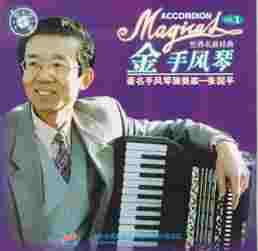
A Three-Horses, Coach Russian Folk Songs arr by I. Panitski
Little Apple, Russian Folk Songs arr by V. Kuznetsov
Hey Thou Nice Little Snowball, Three Russian Folk Songs arr by I. Panitski
Concert Piece, Von Weber arr by A. Dimitriev
Blue Danube Waltz, J. Strauss arr by O. Sharov
Bulgarian Suite, V. Semionov
Moldavian Folk Dance, K. Myaskov
Figaro's Air, G. Rossini arr by A. Dimitriev
The Herdsmaid's Dance, H. Alfven arr by J. Sundeqvist
Italian Polka, S. Rachmaninov arr by I. Yashkevich
Passacaglio, N. Tschaikin
Prelude and Fugure in C Minor, Bach BWV 847
total time: 62'46"
recorded in 1998
review date: June 2000
label: Self Produced
Review by Thomas Fabinski:
From the brief liner notes, we learn that Zhang's entire family - parents, brother and sisters - are all accordionists. At the age of 15, he joined the Chinese Broadcasting Art Company. At 23, he gave his first accordion recital at the Central Conservatory of Music in Beijing. At 27, he placed sixth at the 1987 Klingenthal International Accordion Competition in East Germany and was the first Chinese accordioinist to participate in this competition. He has preformed in Germany, USA, Canada, Poland, Switzerland and France as well as regular appearances on Chinese radio and television.Zhang Guoping's playing sparkles during the playful scherzo-like passages and rhythmic dancing. The Bulgarian Suite is a joy with its uneven meters and accents. The lightness and delicacy of his trills and tremolo are to me what best characterize his musical style. Give me less technical virtuosity and more of the passion and darkness that appears on Moldavian Folk Dance. This piece, for me, has some of the flavor of Piazzolla's Nuevo Tango.
Again, The Herdsmaid's Dance sparkled with gaiety and wit. Tchaikin's Passacaglia is a dark and ponderous work and one which Zhang executes convincingly. In the Bach, there were nice contrasting qualities between the prelude and the fugue. Zhang seemed to try to emulate the sound of a church organ. I wonder what would have happened if he really stretched the rhythm. The accordion is capable of more lightness and grace than a pipe organ. It would be wonderful to hear more of Zhang's natural liveliness combined with the masterful melodies of Bach.
On the negative side, tape splicing to remove register changers were particularly noticeable on track 2. I would rather have heard the clicking of the registers switching. It would be authentic. In addition, the audible register switching is quieter on Zhang's first CD ( 14 Golden Accord Music). To me, it seems as if there's more tape splicing apparently to remove the more prominent register switching noise.
Zhang included a news clipping from Accordion Monthly news, undated, which has a photo of Mogens Ellegaard and Zhang. I will quote the entire article which is a letter from Mogens to the periodical:
"In my own master classes during the two week seminar I has the pleasure of guiding Mr. Zhang Guoping musically and technically in both contemporary Scandinavian literature and Scarlatti Sonatas, and I was impressed by his sound and professional approach to this complicated music. So I can safely state that Zhang Guoping is an excellent ambassador of Chinese accordion. I look forward to meeting him again some day and to exchange ideas and music, be it in Europe or perhaps his native China. A continued exchange of information undoubtedly may be highly valuable for the young Chinese accordion culture."
signed Mogens Ellegaard, Professor, Royal Danish Academy of Music, Copenhagen, Denmark.
Professor Semionov, Professor of the Musical Pedagogical Institute of Gnessins in Moscow, whose work "Don Rhapsody" is perhaps one of his most popular and well known, endorses these comments saying "He (Zhang) makes strong impressions with his wonderful sense of rhythm, and brilliant technique."
| About The Free-Reed Review |
| Invitation to Contributors / Submission Guidelines |
| Back to The Free-Reed ReviewContents Page |
| Back to The Classical Free-Reed, Inc. Homepage |